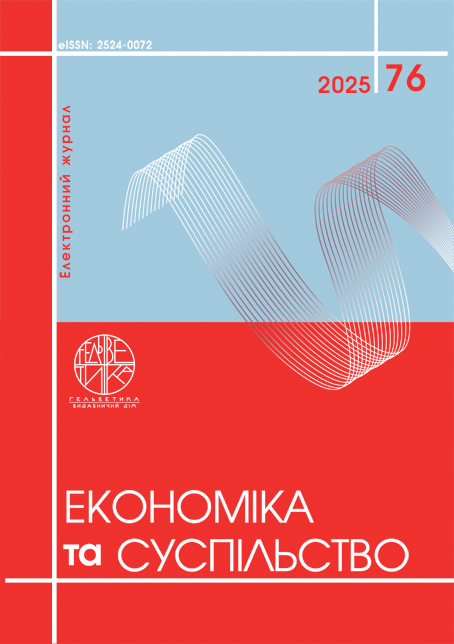POST-PANDEMIC ECONOMIC RECOVERY: ASSESSMENTS OF THE STABILITY OF GLOBAL MACROECONOMIC SYSTEMS
Abstract
The article provides a comprehensive assessment of the stability of global macroeconomic systems in the post-pandemic period with a focus on the impact of the COVID-19 pandemic. The dynamics of macroeconomic indicators in the period from 2001 to 2025, including the pre-crisis, crisis, post-crisis and post-COVID stages, are considered. The results of the analysis showed that the pandemic significantly worsened the macroeconomic stability of most countries, increasing the share of countries with a low level of stability in the post-COVID period. At the same time, the share of countries with a high level of stability decreased which indicates the growing vulnerability of even the most developed economies. Clear structural shifts were observed in the distribution of countries by level of stability which indicates a reassessment of traditional development models. The practical value of the article lies in the formation of approaches to monitoring, modeling and forecasting macroeconomic stability in the context of global crises.
References
Hryhoryan, R. Kh. (2024). Teoretychni osnovy vynyknennia ta rozvytku kryzovykh yavyshch v ekonomichnykh systemakh [Theoretical foundations of the emergence and development of crisis phenomena in economic systems]. Ekonomika ta Upravlinnia APK – Economy and Management of the Agro-Industrial Complex, vol. 1, pp. 59–73. DOI: https://doi.org/10.33245/2310-9262-2024-189-1-59-73 (accessed July 03, 2025).
Kabanova, O. O., Sharoyan, F. A., & Boichuk, A. P. (2025). Vplyv mizhnarodnykh politychnykh kryz na ekonomichnu intehratsiiu rehioniv [Impact of international political crises on regional economic integration]. Akademichni Vizii – Academic Visions, vol. 43. DOI: https://doi.org/10.5281/zenodo.15458894 (accessed July 03, 2025).
Zolkover, A. O., & Bozhenko, V. V. (2020). Pidkhody do otsiniuvannia makroekonomichnoi stabilnosti [Approaches to assessing macroeconomic stability]. Visnyk SumDU. Seriia: Ekonomika – Bulletin of Sumy State University. Series: Economics, vol. 3, pp. 303–308. DOI: https://doi.org/10.21272/1817-9215.2020.3-34 (accessed July 03, 2025).
Chaika, Yu. M. (2025). Inozemni investytsii ta makroekonomichni vyklyky Ukrainy v period viiskovoho stanu [Foreign investments and macroeconomic challenges of Ukraine during martial law]. Derzhava ta Rehiony. Seriia: Ekonomika ta Pidpryiemnytstvo – State and Regions. Series: Economics and Entrepreneurship, vol. 1(135), pp. 42–47. DOI: https://doi.org/10.32782/1814-1161/2025-1-7 (accessed July 03, 2025).
Polianskyi, V. O. (2022). Modeli otsinky stiikosti makroekonomichnykh system do ekzohennykh «shokiv» [Models for assessing the stability of macroeconomic systems to exogenous «shocks»]. Visnyk Kharkivskoho Natsionalnoho Universytetu imeni V. N. Karazina. Seriia: Ekonomichna – Bulletin of V. N. Karazin Kharkiv National University. Series: Economics, vol. 102, pp. 57–68. DOI: https://doi.org/10.26565/2311-2379-2022-102-07 (accessed July 03, 2025).
International Monetary Fund (IMF). (n.d.). IMF. Available at: https://www.imf.org/ (accessed July 03, 2025).
The World Bank. (n.d.). DataBank | The World Bank. Available at: https://databank.worldbank.org/ (accessed July 03, 2025).
Raievnieva, O. V., & Aksyonova, I. V. (2020). Systema vyshchoi osvity Ukrainy v yevropeiskomu osvitnomu prostori: mistse ta perspektyvy rozvytku [The system of higher education of Ukraine in the European educational space: place and development prospects]. Biznes Inform – Business Inform, vol. 12, pp. 97–109. DOI: https://doi.org/10.32983/2222-4459-2020-12-97-109 (accessed July 03, 2025).
Samofalova, M. O. (2024). Samoorganizatsiini karti Kokhonena yak instrument klasteryzatsii mashynobudivnykh pidpryiemstv [Kohonen self-organizing maps as a tool for clustering machine-building enterprises]. Efektyvna Ekonomika – Efficient Economy, vol. 12. DOI: https://doi.org/10.32702/2307-2105.2024.12.45 (accessed July 03, 2025).
Григорян Р. Х. Теоретичні основи виникнення та розвитку кризових явищ в економічних системах. Економіка та управління АПК. 2024. № 1. С. 59–73. DOI: https://doi.org/10.33245/2310-9262-2024-189-1-59-73 (дата звернення: 03.07.2025).
Кабанова О. О., Шароян Ф. А., Бойчук А. П. Вплив міжнародних політичних криз на економічну інтеграцію регіонів. Академічні візії. 2025. Випуск 43. DOI: https://doi.org/10.5281/zenodo.15458894 (дата звернення: 03.07.2025).
Золковер А. О., Боженко В. В. Підходи до оцінювання макроекономічної стабільності. Вісник СумДУ. Серія «Економіка». 2020. №3, С. 303–308. DOI: https://doi.org/10.21272/1817-9215.2020.3-34 (дата звернення: 03.07.2025).
Чайка Ю. М. Іноземні інвестиції та макроекономічні виклики України в період військового стану. Держава та регіони. Серія: Економіка та підприємництво. 2025. № 1(135). С. 42–47. DOI: https://doi.org/10.32782/1814-1161/2025-1-7 (дата звернення: 03.07.2025).
Полянський В. О. Моделі оцінки стійкості макроекономічних систем до екзогенних «шоків». Вісник Харківського національного університету імені В. Н. Каразіна серія «Економічна». 2022. № 102. С. 57–68. DOI: https://doi.org/10.26565/2311-2379-2022-102-07 (дата звернення: 03.07.2025).
International Monetary Fund (IMF). IMF. URL: https://www.imf.org/ (дата звернення: 03.07.2025).
DataBank | The World Bank. DataBank | The World Bank. URL: https://databank.worldbank.org/ (дата звернення: 03.07.2025).
Раєвнєва О. В., Аксьонова І. В. Система вищої освіти України в європейському освітньому просторі: місце та перспективи розвитку. Бізнес Інформ. 2020. №12. C. 97–109. DOI: https://doi.org/10.32983/2222-4459-2020-12-97-109 (дата звернення: 03.07.2025).
Самофалова М. О. Самоорганізаційні карти кохонена як інструмент кластеризації машинобудівних підприємств. Ефективна економіка. 2024. № 12. DOI: https://doi.org/10.32702/2307-2105.2024.12.45 (дата звернення: 03.07.2025).
Copyright (c) 2025 Владислав Полянський

This work is licensed under a Creative Commons Attribution 4.0 International License.


